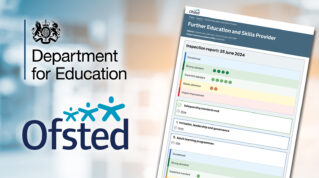As we embark on the most significant social and economic transition since the industrial revolution, there is growing recognition of the further education and skills (FES) sector’s importance for upskilling young people, reskilling existing workers, driving productivity and promoting social justice.
Despite this, there is limited research into what works well and what requires improvement. In particular, the FES sector has faced huge challenges relating to external accountability through Ofsted and its education inspection framework (EIF).
Following recent debate and scrutiny around Ofsted, there is a strong appetite for improving the inspection regime.To achieve this, understanding the impact of inspections on FES institutions is critical.
To that end, the Edge Foundation is today publishing a new report, Ofsted Inspection in the General Further Education and Skills Sector in England, led by Dr Bernie Munoz-Chereau at UCL Institute of Education.
The study aims to add missing voices to the debate around the impacts, benefits and disadvantages of Ofsted inspections in the FES sector, addressing a gap created by limited academic research in this area.
Key findings
The study includes a detailed literature review and combines qualitative and quantitative data collection and analysis. This has provided a robust understanding of the issues surrounding inspections in the sector.
Our comprehensive study explores the perspectives of 53 stakeholders – including tutors, governors, middle managers and senior leaders across various types of FE colleges – and how they feel Ofsted inspections have positively and negatively impacted their institutions.
In terms of benefits, participants noted that Ofsted inspections serve as a stamp of approval and quality assurance, enhancing their institutions’ reputation, boosting self-assurance among staff and acting as a marketing tool to support student enrolment.
However, significant concerns were also raised about the negative effects of inspections. Increased workload, detrimental impacts on staff wellbeing, challenges with staff retention and constraints on innovation were common themes.
Additionally, while many participants acknowledged the improvements brought by the Education Inspection Framework (EIF) in 2019 – such as a greater emphasis on curriculum quality and student learning – they criticised its reductionist approach.
Many expressed concerns that the EIF can lead to subjective judgments and unintended consequences that overlook the complexities of their college environments.
Furthermore, participants more or less unanimously agreed that one-word judgments failed to adequately reflect their hard work and that they would welcome a shift towards inspection reports as supportive documents to help colleges improve.
The full report contains extensive details on these and other findings, including specific examples and participant feedback.
Recommendations for improvement
When scrutinising any system, the temptation is to focus solely on what does not work. However, we must also recognise Ofsted’s vital quality assurance role.
With this in mind, our report emphasises five policy and practice recommendations made by participants. These build not only on what does not work well but on what does. The hope is to bring nuance tob the broader discussion around Ofsted’s role.
1. Reduce high-stakes nature of inspections
To create a more supportive environment for improvement, it is essential to lessen the high-stakes atmosphere around inspections.
Participants suggested that reducing the consequences associated with inspection outcomes – such as public reporting or potential college closures – would help produce a more constructive atmosphere where FES institutions can focus on genuine improvement.
2. Make inspections developmental and supportive
Many stakeholders called for a shift towards advisory inspections that are non-judgmental and supportive. Doing so would seek to enable institutions to openly share best practices and seek guidance rather than facing punitive measures.
3. Remove overall grades
Participants advocated for eliminating one-word judgments altogether. Others also favoured a more nuanced assessment approach to recognise individual departments.
Highlighting the need for a more detailed evaluation process, one respondent noted: “Each department has strengths and weaknesses and staff feel that their department is not recognised in the overall Ofsted reports.”
4. Expand inspection reports
There was a strong consensus that inspection reports should become more explanatory and tailored towards improvement strategies. Some suggested that more detailed reports with contextual information around grading would provide institutions with clearer guidance on how to effectively enhance their practice.
5. Extend inspection visits
Allowing inspectors more time to engage with institutions could lead to a deeper understanding of their unique cultures and challenges. Participants suggested that extended visits would enable inspectors to observe practices holistically rather than rushing through assessments.
This report is timely, coinciding with intense scrutiny around the inspectorate’s current methods. The new Labour government recently scrapped overall single-word Ofsted judgments in the school sector, highlighting a potential shift towards a more nuanced, supportive framework for evaluating educational performance.
FES faces many challenges including funding disparities and the need for urgent skills development to meet local labour market demands. The sector also faces a huge staff retention and recruitment crisis.
A less punitive and more supportive Ofsted could tackle this by reducing the number of staff leaving the sector.
One thing is certain: there is growing recognition of the need for transparency and a continuous improvement mindset across educaiton. We hope this new report will offer valuable insights for educators, policymakers and other stakeholders.
Download the full report here















Your thoughts